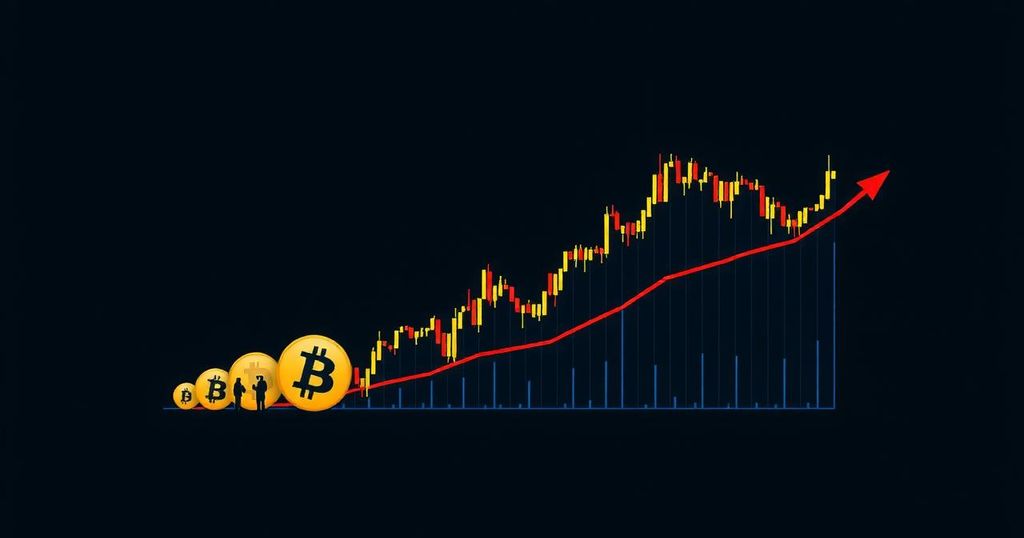Bitcoin Price: Analyzing the Impact of Trump vs. Harris on BTC
As the 2024 U.S. presidential election nears, discussions on its impact on Bitcoin intensified, particularly through the views of Mark Moss. He suggests that if Trump wins, Bitcoin could reach $400,000, while a Harris victory might see it stagnate around $100,000 to $150,000. He emphasizes Bitcoin’s global value and its high sensitivity to liquidity changes, as well as potential economic challenges that could affect the cryptocurrency market.
As the 2024 United States presidential election approaches, discussions surrounding its potential influence on Bitcoin pricing are becoming increasingly prevalent among cryptocurrency enthusiasts and investors. Notably, American entrepreneur Mark Moss recently provided his analysis on how the competition between Donald Trump and Kamala Harris may affect the future of Bitcoin, while also considering the current macroeconomic landscape. Moss highlights the pivotal role the U.S. election could play in the trajectory of Bitcoin prices. He posits that a victory for Trump might lead to significant positive repercussions for Bitcoin. “Trump and RFK have said they would put Bitcoin on the reserves,” Moss pointed out, indicating that this strategy could compel other nations to adopt similar policies, particularly noting El Salvador’s existing commitment to Bitcoin. This scenario, which Moss terms a “game theory,” suggests that countries would engage in a competitive race to accumulate Bitcoin, subsequently driving its price to unprecedented heights. He predicts that under Trump’s leadership, Bitcoin could potentially soar to $400,000 by the following year. Conversely, Moss foresees a far less promising scenario for Bitcoin should Kamala Harris win the election. He references the Biden administration’s aggressive regulatory approach towards the cryptocurrency sector, which has included actions such as the Federal Reserve denying bank charters and legislative efforts led by figures like Elizabeth Warren that could impose severe restrictions on Bitcoin mining. Under Harris, Moss estimates a more modest Bitcoin price target of between $100,000 and $150,000. Nevertheless, he emphasizes that “Bitcoin is a global asset” and asserts its likelihood to thrive irrespective of U.S. governmental policies. In addition, Moss underscores the inherent relationship between Bitcoin’s performance and liquidity, particularly as it correlates with the U.S. M2 money supply. He states, “As liquidity goes up, Bitcoin goes up,” asserting that various assets respond to shifts in liquidity at different rates. For example, he notes that Bitcoin demonstrates a sensitivity ratio of approximately 8.95 times compared to just 1.45 times for gold. This elevated sensitivity indicates that expanding liquidity is likely to cause substantial price surges in Bitcoin. Moss elaborates on the anticipated expansion of the U.S. monetary base, projecting a growth of about 10% annually, which he believes will correlate with Bitcoin’s price increases at nearly 90% of this growth rate. He asserts, “We’re right on track,” in reference to Bitcoin’s historical performance in line with rising liquidity levels. Broader macroeconomic conditions and Federal Reserve policies are also crucial factors affecting Bitcoin. Moss expresses confidence that a market crash is not imminent, despite prevailing inflation worries. Following a recent 50 basis point rate cut by the Fed, he notes that the economic landscape could undergo significant shifts. He cautions about the potential for an “inflationary crash,” characterized by soaring costs of living that outpace wage growth. “While everybody’s expecting a deflationary crash, I’m expecting an inflationary crash,” Moss contends, signifying that this paradigm could threaten living standards while simultaneously presenting Bitcoin as a preferred hedge against inflation. Additionally, institutional interest in Bitcoin is rising, as evidenced by MicroStrategy’s recent investment of $458 million, alongside impressive inflows into Bitcoin Exchange-Traded Funds (ETFs), totaling $397 million in the last week. These developments may provide essential momentum for Bitcoin prices in the short term.
The discourse surrounding the impact of political events on Bitcoin is pivotal for investors and market analysts. The 2024 U.S. presidential election represents a crucial juncture for financial markets, where potential changes in leadership can significantly influence economic policies, especially concerning cryptocurrency regulation. Mark Moss, a notable figure in the cryptocurrency space, provides insights into how the electoral outcomes between Donald Trump and Kamala Harris could fundamentally affect the price trajectory of Bitcoin and the broader monetary landscape.
In summary, the upcoming U.S. presidential election is anticipated to have far-reaching implications for Bitcoin’s future. Mark Moss suggests that a Trump presidency could lead to soaring Bitcoin prices due to proposed policies that would recognize Bitcoin as a reserve asset. Conversely, a Harris presidency might restrict Bitcoin growth amid a regulatory environment perceived as hostile to cryptocurrency. Furthermore, the dynamics of liquidity and macroeconomic conditions, including potential inflationary scenarios, will continue to play integral roles in shaping Bitcoin’s valuation moving forward.
Original Source: www.cryptonewsz.com








Post Comment